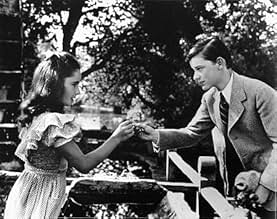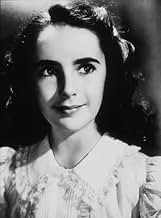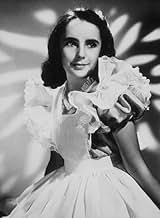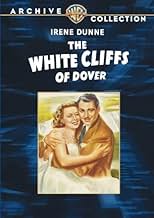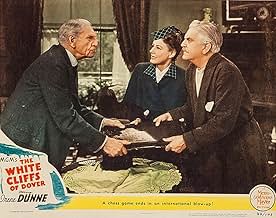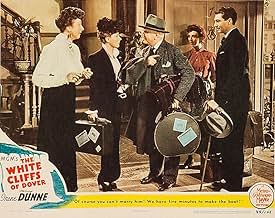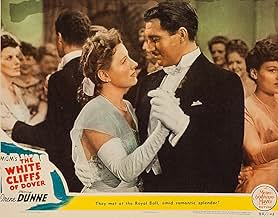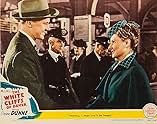अपनी भाषा में प्लॉट जोड़ेंSusan travels with her father to England for a vacation. Invited to a ball, Susan meets Sir John Ashwood and marries him after a whirlwind romance. However, American Susan never quite adjust... सभी पढ़ेंSusan travels with her father to England for a vacation. Invited to a ball, Susan meets Sir John Ashwood and marries him after a whirlwind romance. However, American Susan never quite adjusts to life as a new member of the British gentry.Susan travels with her father to England for a vacation. Invited to a ball, Susan meets Sir John Ashwood and marries him after a whirlwind romance. However, American Susan never quite adjusts to life as a new member of the British gentry.
- 1 ऑस्कर के लिए नामांकित
- 3 जीत और कुल 1 नामांकन
- Nanny
- (as Dame May Whitty)
- English Cabbie
- (बिना क्रेडिट के)
- Chauffeur
- (बिना क्रेडिट के)
- Immigration Officer
- (बिना क्रेडिट के)
- Major Rupert Bancroft
- (बिना क्रेडिट के)
- Indian Major in Boardinghouse
- (बिना क्रेडिट के)
फ़ीचर्ड समीक्षाएं
I heard it said that the main fact about the 20th Century that one should realize in studying it is that the United States and Great Britain both spoke a common language. That fact made us overcome a few cultural differences and was the reason America entered two World Wars to save a Great Britain from invasion.
Thus it was for Irene Dunne who came over with her father Frank Morgan on holiday in 1914 and met and married a minor titled fellow played by Alan Marshal. Marshal is killed and she spends a long widowhood raising their son and heir to his title. She lives with her mother-in-law, Gladys Cooper and raises her son who at various times is played by Roddy McDowall and Peter Lawford. The son rather fancies the daughter of one of their tenants played at various times by Elizabeth Taylor and June Lockhart.
Of course this interoceanic love feast has a rather rocky beginning, especially when Frank Morgan while arguing chess with C. Aubrey Smith gets confronted with the fact that the chess board and pieces were the property of the looted White House from the War of 1812. It's my favorite scene in the film.
Dunne who ages gracefully and magnificently gives a stirring performance as a woman who lost what she loved in one war and is ready to sacrifice again for her adopted country. I've a feeling that the folks at MGM might have had her character as an answer to that real female American expatriate, Lady Nancy Astor and that we were all not members in good standing of the Nazi appeasing Cliveden set.
There's also a scene similar to the one in Mrs. Miniver where Greer Garson has to entertain a wounded German flier, Helmut Dantine where he's made a symbol of what they're at war against. Dunne, Morgan, and McDowall entertain a pair of German boys on holiday and when the discussion turns to politics it gets pretty heated. These two are thinking nothing more than winning what they should have won back in 1918.
The White Cliffs Of Dover is a nice film, typical of the era it came out of. You do wonder though if Irene Dunne had met a nice German guy from the Weimar Republic days how that might have been dealt with.
Her memories consist of the tale of a Yankee girl, Irene Dunne as Susan Dunn, who goes on a two week vacation to England with her father and on her last day there meets a member of the English gentry who is instantly smitten by her and talks her into staying and marrying him. At first Susan feels out of her element as Lady Ashwood, but she quickly finds her footing. She and her husband, Sir John Ashwood, don't even have time for a honeymoon as WWI starts and he is off to fight with his regiment. After three years he finally gets a few days leave, but it is long enough to conceive his son, John Ashwood Jr., or John Ashwood II as the British would say.
Irene Dunne always gave good subtle performances in parts that could have easily gotten ham-fisted, and this role is no exception. Frank Morgan as her Yankee dad is a revelation as he is for once not the befuddled comic relief but a spirited American father who wants his daughter home in America before her marriage, and safe from the Nazi bombs as the winds of a second war approach. C. Aubrey Smith lends terrific support as Colonel Walter Forsythe, considered a crackpot at the boarding house where he and the Dunns were staying during their trip, because he claims to have a standing invitation to the most exclusive ball in England, but seems to just be a common pensioner. Well it turns out he really can turn pumpkins into carriages after all. Roddy McDowell plays John Jr., and he is smitten by one of the daughters of the tenant farmers on the estate played by a twelve year old Elizabeth Taylor in only her third credited role. Their scenes together are just too cute.
As with most of the WWII films there are a few lines and a few scenes that get over the top just a bit. There are the American soldiers marching through the streets of London to rousing patriotic songs played by a military band as the film comes full circle. There are the two German preteens who are friends of John Jr. during the early 1930's who just happen to erupt into Nazi propaganda at the dinner table. I was surprised one of them didn't put a comb under his nose and start imitating the Bohemian corporal. And then there is grief that takes all of 15 seconds in spite of its cruel irony because you just HAVE to keep that stiff upper lip! But it's not overdone for a film that is over two hours long, and it does take that long to do the tale justice.
Alas, when they arrive, they are treated to the typical rainy weather, that puts a damp, no pun intended, in her enjoyment of a city and all things English she has always admired. Instead of finding a place that meets all her expectations, Susan has to endure the weather and the prospect of going back without seeing the sights and places she really wanted to see.
Enter the kind Colonel, the man living in the modest hotel where the Dunns are staying. He invites Susan to a society ball where she meets Sir John Ashwood, the man who will become her husband. John is instrumental in her staying in England. Susan never expected to be married into the rich gentry that John belongs to. In fact, the beginning of her life in the family country estate convinces her she doesn't belong.
It's 1915 and WWI arrives without warning. Susan sees in horror how John goes to his regiment and to the front. He eventually dies, but the son that arrives for her is, in a way, a painful reminder of the great loss she suffered. Like his father, the boy grows up and has to go to war, as it's expected of his kind.
"The White Cliffs of Dover" was directed by Clarence Brown, who gave it a great look. Irene Dunne makes a good impression as Susan, the courageous woman who stays in a strange country and has to make a new life for herself and her new family. Alan Marshal is perfect as the dashing John Ashwood.
In minor roles we see Roddy McDowall, who plays the young John Ashwood. Harry Morgan is Susan's father. Gladys Cooper, May Witty, Peter Lawford, Van Johnson, C. Aubrey Smith, and the rest of the cast do good work. The young Elizabeth Taylor is seen as the young Betsy and June Lockhart appears as the grown up girl in uncredited roles.
"The White Cliffs of Dover" is about loyalty for one's country and how tradition plays a role in the lives of all the people one meets in the story, even during the difficult times these characters had to live.
क्या आपको पता है
- ट्रिवियाIrene Dunne reads a telegram from her Anglophobe father to a group of English people. Her father begs her not to marry an Englishman she is in love with and tells her "You're a Yankee through and through! Think of Paul Revere! Think of the Old North steeple! Remember the Alabama!" The viewer may become confused at this point. "Remember the Alabama"? Shouldn't it be "Remember the Alamo"? However, since the context of the telegram is anti-British any mention of the Alamo would be irrelevant. What Irene Dunne's father is apparently taking about is the C.S.S. Alabama, one of several Confederate warships that were built in British shipyards over United States protest during the Civil War. These ships attacked U.S. shipping in the Atlantic Ocean. Since Irene Dunne arrives in England in April of 1914 and married just before August 4, 1914 when Great Britain declared war on Germany, the telegram was probably sent close to the 50th anniversary of the sinking of the Alabama by the U.S.S. Kearsarge on June 19, 1864 in the English Channel. The United States sued Great Britain in 1869 over the building of the Confederate warships and was awarded $15.5 million.
- गूफ़A gift with a plaque dedicated to First Lady, Dolley Madison, misspells her name "Dolly Madison."
- भाव
Susan Dunn's landlady: [Of Susan]
Susan Dunn's landlady: Such a nice young thing! Not a bit like an American.
- इसके अलावा अन्य वर्जनElizabeth Taylor's scenes are often deleted in older TV prints.
- कनेक्शनFeatured in Twenty Years After (1944)
- साउंडट्रैकAuld Lang Syne
(1788) (uncredited)
Traditional Scottish 17th century music
Lyrics by Robert Burns
Played during the opening credits and often in the score
टॉप पसंद
विवरण
- रिलीज़ की तारीख़
- कंट्री ऑफ़ ओरिजिन
- भाषाएं
- इस रूप में भी जाना जाता है
- Dovers vita klippor
- फ़िल्माने की जगहें
- उत्पादन कंपनी
- IMDbPro पर और कंपनी क्रेडिट देखें
- चलने की अवधि2 घंटे 6 मिनट
- रंग
- पक्ष अनुपात
- 1.37 : 1
इस पेज में योगदान दें



